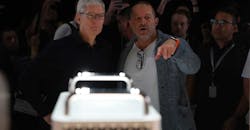Apple Is Denied Tariff Relief on Five Mac Pro Parts After Staying in Texas
Apple Inc. was denied relief for tariffs on five Chinese-made components for the upcoming Mac Pro computer, even after the company announced it was keeping some assembly operations in the U.S.
The U.S. Trade Representative’s office on Monday said it didn’t grant reprieve from 25% tariffs on the much-discussed optional wheels for Apple’s Mac Pro, a main circuit board, power adapter, charging cable and a cooling system for the computer’s processor.
The decision comes about a week after Apple announced it would make new Mac Pro computers in Austin, Texas after originally considering shifting production to China like its other products. The move followed an announcement earlier this month that the U.S. trade office had agreed to Apple’s request for tariff waivers on 10 out of 15 Chinese parts.
Apple said it didn’t have any comment beyond last week’s announcement. USTR wasn’t immediately available for comment.
Exclusion decisions are based on whether a product is available only from China, is strategically important or related to Chinese industrial programs, and whether duties will “cause severe economic harm” to the company or U.S. interests. In announcing that the Mac Pro would continue to be made in Texas, Apple applauded the Trump administration for its tariff relief on the other components, including the computer’s casing and accessories like the mouse and trackpad.
No Other Source
In its 15 requests for exclusions posted July 18, Apple said the devices or components are not related to Chinese industrial programs -- and that “there are no other sources for this proprietary, Apple-designed component.”
Trump had signaled that relief from tariffs would be rejected, saying in a July 26 tweet that “Apple will not be given Tariff waiver, or relief, for Mac Pro parts that are made in China. Make them in the USA, no Tariffs!” But the president later told reporters “we’ll work it out” and that “I think they’re going to announce they’re going to build a plant in Texas.”
Apple’s requests involved goods that are part of $200 billion in Chinese products hit with tariffs last September. Trump increased the duty on that batch to 25% from 10% in May. The rate is due to rise to 30% on Oct. 15, including on another $50 billion of goods also hit last year.
Products such as the Apple Watch, AirPods and iMac computers were hit by 15% tariffs earlier this month, while the iPhone, iPad and other major Apple products are set to be impacted later in December. Apple has maintained that its products are primarily designed in the U.S. and has grown its local investment since the trade war began brewing.
About the Author
Bloomberg
Licensed content from Bloomberg, copyright 2016.
